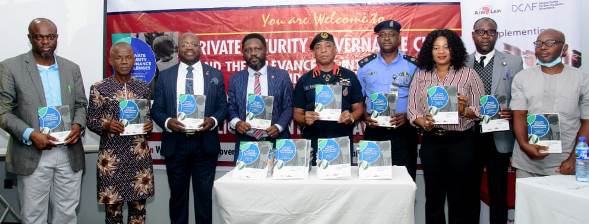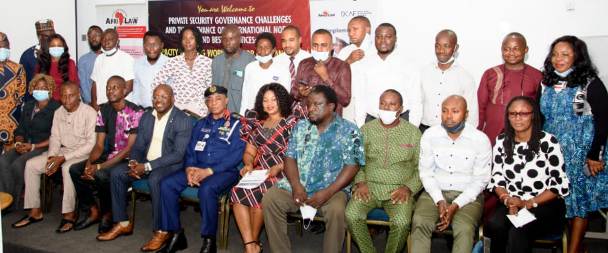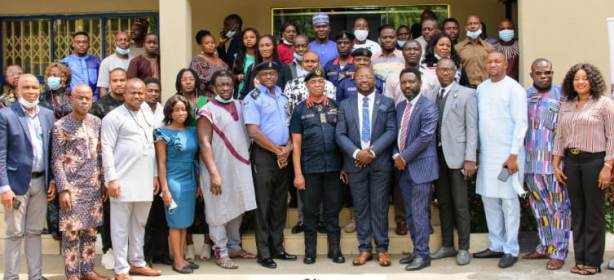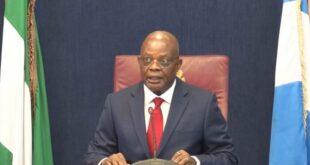Challenges confronting private security governance in Nigeria, and the role of civil society organizations and the media at addressing them in line with international best practices, took centre stage at the nation’s capital, Abuja, last Tuesday, as a non-governmental organization, African Law Foundation (AfriLaw), brought together stakeholders from across the country to the unveiling of a guide for CSOs and media.
Tagged: ‘Private Security Governance Challenges and the Relevance of International Norms and Best Practices: A Guide for Civil Society and Media,’ the document examines governance challenges in the private security sector, the relevance of international best practices and puts forward a toolkit for the civil society and media in relation to monitoring and carrying out oversight in the sector.
The two-day event, organized by AfriLaw, in conjunction with Geneva-based DCAF – Geneva Centre for Security Sector Governance, afforded stakeholders from the six geo-political zones of the country, as well as the top brass at the Nigeria Security and Civil Defence Corps (NSCDC), Police, other security agencies, CSOs and the media, the opportunity to brainstorm on improving governance issues in the sector as well as examine being launched.
In an address via Zoom, senior project officer at DCAF, Emmylou Boddi, reminded the audience of the collaboration between her organization and AfriLaw, which is aimed at strengthening private security governance in Nigeria. This collaboration, our correspondent reports, began three years ago with the research and publication of a baseline study on the private security sector in Nigeria by AfriLaw.
Boddi noted that DCAF has been “supporting the Private Security Governance Observatory, where we facilitated the creation of a network of civil society organizations and media across Africa to support them in playing an active role in the promotion of good private security sector governance. And it is also in this framework that we started our partnership with AfriLaw.
“I am happy to be here today to launch the latest publication, the ‘Private Security Governance Challenges and the Relevance of International Norms and Best Practices: A Guide for Civil Society and Media.’
“The drafting of this tool has been really wonderful experience as we started with a structure that is based on the international norms and best practices from our three core initiatives, that is The Montreux Document, International Code of Conduct (ICOC) and Voluntary Principles on Security and Human Rights (VPs).
“It is within this structure, we asked civil society and media representatives to share their experience and their expertise with us on each of these challenges to help bring a real vision of what the situation on the ground really is and to reflect experiences and perspectives from Nigeria, from each region of Nigeria,” she said.
Boddi added that “at DCAF we support multi-lateral institution and international initiative that promote responsible business conduct, and under the umbrella of the Private Security Governance Observatory we aim to strengthen civil society and media engagement to proving private security sector oversight, accountability and human rights protection.”


Founder/CEO of African Law Foundation (AfriLaw), Barr Chinwike Okereke, said the launch event “is part of activities under our ‘Strengthening Private Security Regulation and oversight in Nigeria’ a project being implemented by Afrilaw foundation and Geneva Centre Security Sector Governance (DCAF), in partnership with private governance Observatory and NSCDC, and support of the Association of Licensed Private Security Practitioners of Nigeria (ALPSPN).”
He said that as crime, violence and insecurity rises in Nigeria, the demand for private security services has strongly increased in the last decades, while noting that “in many contexts, national legal frameworks and policies do not effectively regulate the industry, and there is lack of oversight.
“This leads to increased risks of human rights abuses, such as sexual harassment, exploitation and abuses, as well as excessive use of force.
“In this regard, civil society plays fundamental roles in promoting a better understanding of private, also the ensuring that violations are reported, and that applicable national laws and policies address all relevant issues.
“CSOs and media who are conscious of their role covering such topics are important in holding government and private security providers to account for their actions and policies, and can build the necessary bridges between key stakeholders, including government’s private industry Actors as well as affected individuals/ communities and public at large,” Barr. Okereke said.
He explained that the guide was developed to empower a strong and informed Civil Society adding, that it provides updated information in the various challenges linked with private security companies activities in Nigeria, with detailed overview for each of the six geopolitical zones of the country.
Commandant General of Nigeria Security and Civil Defence Corps (NSCDC) Mohammed Abubakar Audi, represented by Assistant Commandant General Raji Ibrahim, in charge of Private Security Guards, stressed the need for a robust synergy among security agencies in the country.
He said the NSCDC is constitutional empowered to regulate activities of private security companies in the country, and it is not relenting in ensuring that operators conform to best global practices.
To this end, the NSCDC is developing a data bank to profile personnel of private security companies, “in order to effectively and efficiently monitor the activities of the guards and checkmate the issues of human rights abuse and professional misconduct.”
The CG noted that the NSCDC is fully in support of the Nigeria Private Security Industry Bill which is receiving the attention of the minister for Interior, expressing hope that if the bill is successful at the National Assembly, it would address the challenges currently been experienced in the industry.
Senior officer at the Police headquarters, Abuja, Mr. Olumuyiwa Adejobi, who represented the Inspector General of Police, Akali Baba, described the launch of the private security toolkit by AfriLaw as apt, especially coming at a time when the nation is confronted with alarming insecurity challenges.
He noted the need for collaboration across agencies to effectively curbing the menace of insecurity across the country, while commending AfriLaw and DCAF for their efforts towards enthroning private security governance in line with global best practices
The IGP said that as part of measures at tackling the security situation, the Nigeria Police is proposing the setting up of private detective schools, and training of private investigators..
Mr. Tunde Ajala, representing the deputy head of mission at the Embassy of Switzerland to Nigeria, Mr. Lukas Schifferle, noted the importance of enthroning international best practices in private security governance in the country. He however urged stakeholders to put hands on deck to ensure this is achieved, adding that adherence to best practices can only be achieved through the concerted efforts of stakeholders.
Reviewing the document being presented to the public, Dr. Ndubuisi Nwokolo, managing partner and chief executive of Nextier SPD, noted that the growth of private security industry “does not mean that the state is shelving off its responsibilities,” but that security responsibilities “are becoming too much for Nigerian state such that we need private security companies to come in and assist.”
He noted that though the Nigerian security industry has grown by 40% in the last five years, it was struggling with issues of regulations and civilian oversights.
Papers presented at the two-day event include: ‘Monitoring and Reporting of PSCs Human Rights Abuses,‘ by Dr Austen Bisina, programme manager, LITE-Africa; ‘Gender and PSCs,‘ by Barr Okereke Chinwike, and ‘The Relevance of MD/ICoCA to Nigeria and Why Nigeria Should Join the Initiative,‘ by Mr Nwakonye Obinna, deputy director (Human Rights Institute, National Human Rights Commission.
The event included a panel presentation on the launch document, ‘Private Security Governance Challenges and the Relevance of International Norms and Best Practices: A Guide for Civil Society and Media’ by Barr Chinwike Okereke, Mr. Kelechi Nwaucha, Mr Ignatius Okpara, Mr Abba Bello Ahmed, Mr Saviour Akpan and Mbami Llia Sabka
 PH Mundial – Port Harcourt Online Newspaper News Across The Region
PH Mundial – Port Harcourt Online Newspaper News Across The Region





